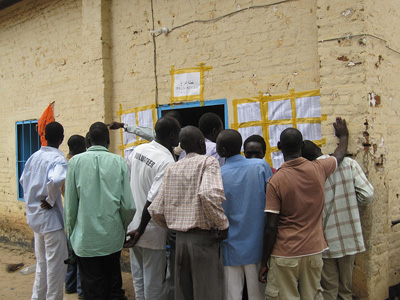As five days of intense balloting for hundreds of government seats across 16,000 polling centers came to a close today in Sudan, simmering tensions, a reminder of the tremendous potential for violence that still remains, began to emerge in the largely peaceful exercise.
Violence broke out in the westernmost corner of South Sudan, where soldiers in the South Sudanese army, or SPLA, shot and killed nine individuals, five of whom were officials of the ruling party, the NCP. The motivations for the killings are unclear—the SPLA claims it was an act of personal vengeance—but the timing of the act, as voters were going to the polling stations to vote between the two political rivals, should not be overlooked.

On the fourth day of polls, an armed group attacked three voting centers in oil-rich Southern Kordofan state, the site of long-standing tensions between southern army soldiers and nomadic communities. A spokesman for the group said in an interview to Radio Miraya that the group did not recognize the elections because there is still ongoing conflict in both Darfur and South Kordofan.
Fighting also broke out at a polling center in Northern Bahr el Ghazal, in South Sudan. According to an undisclosed source, SPLA soldiers clashed with locals at a voting station and nine independent candidates were arrested. On the same day, an SPLM candidate reportedly interfered with the ballot boxes.
Harassment and physical abuse were also widely reported. The African Centre for Peace and Justice Studies reported several incidents, including one in a northern Sudanese state, where an independent contender was beaten by an NCP candidate and later stabbed by unidentified men. On Thursday, 19 Sudanese observers were forcibly removed from three polling centers in Juba and taken to a police station where they were detained.
Other disturbing reports that hint at the political manipulations of the exercise include the cancellation of elections in 17 national constituencies and 16 regional ones, an NCP extortion scheme in Darfur and other isolated instances of ballot manipulation. Towards the end of the voting period, the ruling NCP proclaimed its intention to include all opposition parties in the new government—no doubt in an attempt to appear democratic as it continued to offer power-sharing arrangements outside of democratic institutions. The ruling party’s quiet manipulations and co-optation of rivals may end up preserving a resentful peace—or, it may only anger those Sudanese who had expectations of change and bring even more violence.
The potential for conflict does not end with the elections. In the post-elections period, with counting set to begin on Friday and official results announced next Tuesday, one major source of violence that international observers should keep an eye on is the governor’s race in Unity State, South Sudan. The tensions at play in this local race, pitting incumbent Taban Deng against Angelina Teny, are representative of the disconcerting high-level divisions within the SPLM party as a whole. Deng, supported by South Sudanese president Salva Kiir is challenged by Teny, wife of Vice President Riek Machar. With each major player in control of various parts of the military and police, not to mention personal bodyguards, Unity State is rife with the possibility for violence.
As the electoral process goes forward, the international community must move past its single-minded focus on the technicalities of the ballot to the larger implications that post-election hostilities and electoral results may have on peace in the country. With so many pre-existing national and local tensions in place, the potential for violence still looms large—and with the way that the elections have gone, perhaps even larger.
Editor’s Note: The original post stated that elections in "20 constituencies" were canceled. This was corrected to read "17 national constituencies and 16 regional ones."

